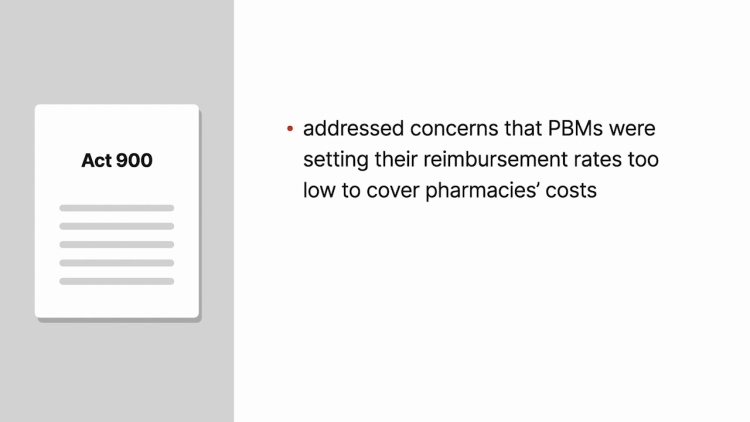Rutledge v. Pharmaceutical Care Management Association
United States Supreme Court
141 S. Ct. 474 (2020)
- Written by Alexander Hager-DeMyer, JD
Facts
A pharmacy benefit manager (PBM) was an intermediary between prescription-drug plans and pharmacies that filled beneficiaries’ prescriptions. A beneficiary would go to the pharmacy to fill a prescription, and the pharmacy would check with a PBM to determine the beneficiary’s coverage and copayment. Once the prescription was given to the beneficiary, the PBM then reimbursed the pharmacy for the prescription, minus the copayment, and the prescription-drug plan reimbursed the PBM. PBMs determined reimbursement rates by developing maximum allowable costs (MAC) lists. PBMs earned profits by having plans issue greater reimbursements than the PBMs gave to pharmacies. The State of Arkansas (defendant) implemented Act 900 to require PBMs to reimburse Arkansas pharmacies at a price equal to or higher than the price the pharmacy paid to buy the drug from its wholesaler. To accomplish this goal, Act 900 required PBMs to frequently update their MAC lists when drug prices increased and to provide pharmacies with an administrative-appeal process for challenging the MAC list rates. Pharmacies were also permitted to refuse a drug sale if the PBM provided reimbursement lower than the pharmacy’s acquisition cost. The Pharmaceutical Care Management Association (PCMA) (plaintiff), an association of PBMs, filed suit in federal court, claiming that Act 900 was invalid because it was preempted by the Employment Retirement Income Security Act (ERISA). The district court agreed, and the Eighth Circuit affirmed the district-court ruling. Arkansas appealed to the United States Supreme Court.
Rule of Law
Issue
Holding and Reasoning (Sotomayor, J.)
Concurrence (Thomas, J.)
What to do next…
Here's why 907,000 law students have relied on our case briefs:
- Written by law professors and practitioners, not other law students. 47,100 briefs, keyed to 996 casebooks. Top-notch customer support.
- The right amount of information, includes the facts, issues, rule of law, holding and reasoning, and any concurrences and dissents.
- Access in your classes, works on your mobile and tablet. Massive library of related video lessons and high quality multiple-choice questions.
- Easy to use, uniform format for every case brief. Written in plain English, not in legalese. Our briefs summarize and simplify; they don’t just repeat the court’s language.





